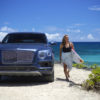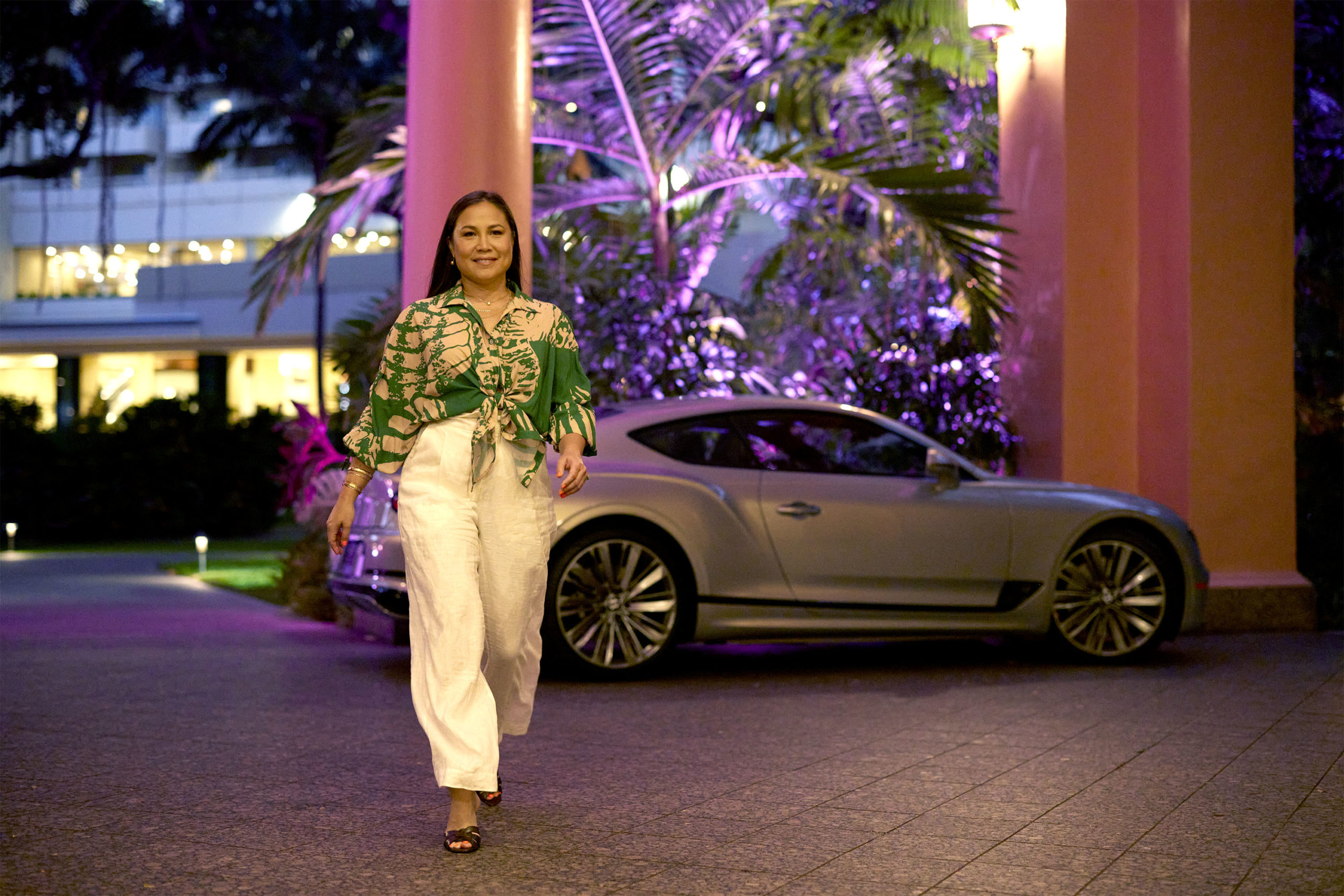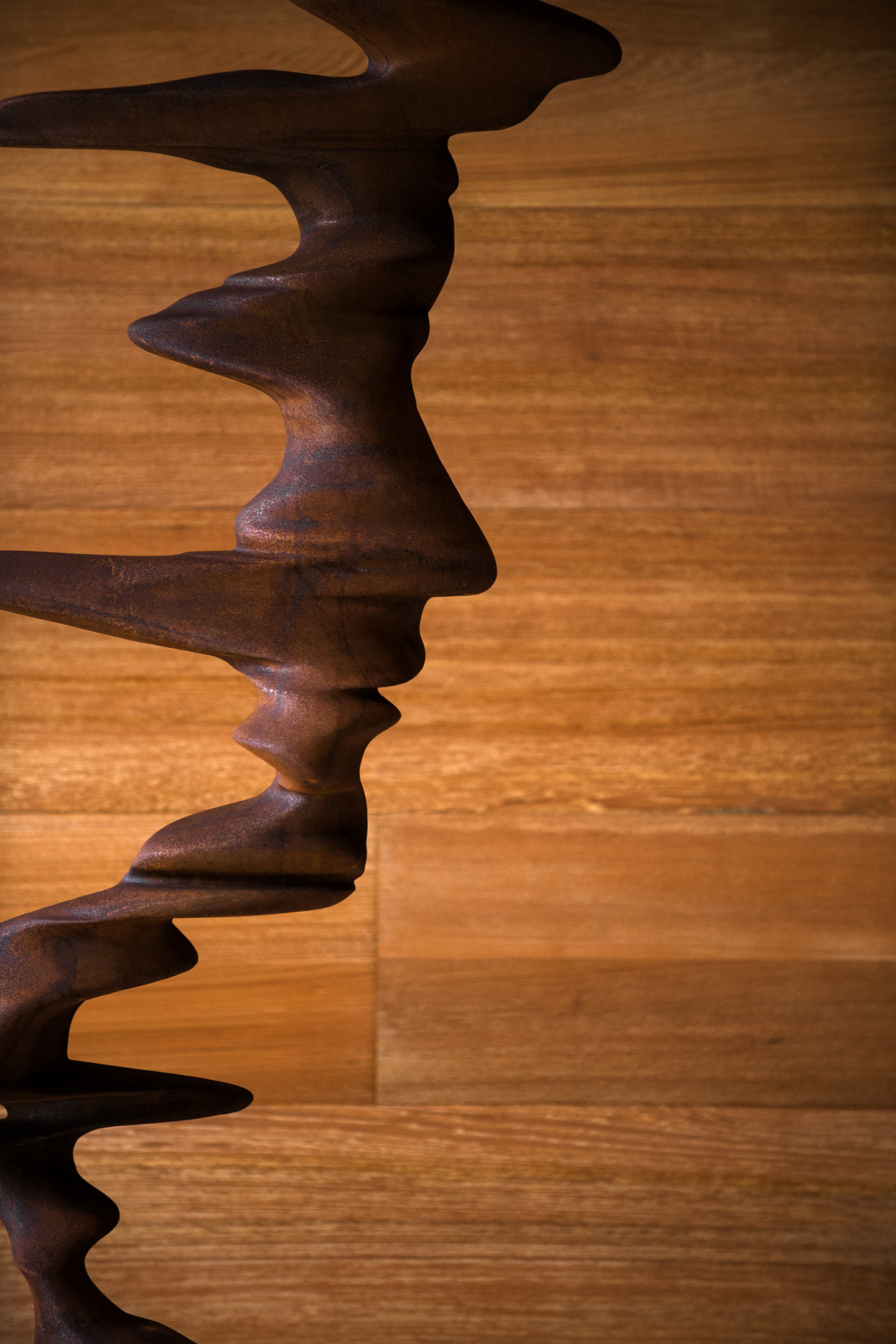By Marc Graser
Photos by Zak Noyle
In collaboration with Bentley Motors.
In partnership with Bentley Motors, meet five inspirational women — interior designer Breegan Jane, Olympic surfer Carissa Moore, wine expert Vanessa Price, Shaka Tea founder Isabella Hughes and business incubator Meli James — all passionate thought leaders in their communities who define success and what modern luxury means today through their inherent curiosity and appreciation for detail.
There’s a belief in Hawaii that you have to leave the islands to be successful in business. Meli James is proving otherwise.
James is the co-founder of Mana Up, an initiative to help entrepreneurs grow their Hawaii-born businesses and provide them with the resources to scale globally.
Since being introduced in 2018, the accelerator program has backed 74 companies, or cohorts, as they’re known — and in pretty much every category, including food, fashion, art, health and beauty.
James saw an opportunity to tap into the appeal of Hawaii among people who have visited the islands or aspire to one day.
“The brand of Hawaii is actually bigger than tourism,” James says. “The brand is globally loved, globally recognized. It’s aspirational.”
While the 10 million tourists that visit Hawaii each year can help create much of that feeling, James wants her cohorts to think bigger.
“We do have some of the best products,” she says. “These companies are competing and winning competitions at a global level. They need to have the mindset that they can scale globally.”
That mindset is certainly working for Hawaii’s coffee growers, while KōHana Rum and Manoa Chocolate have taken home top prizes in international competitions in their categories.
“We’re cheering each other on,” James says. “We’re not creating these cute products that are good for Hawaii. They’re these gorgeous, valued products that have been our best kept secrets. Now how do we help them get out to the rest of the world and be seen as best in class?”
We’re cheering each other on. We’re not creating these cute products that are good for Hawaii. They’re these gorgeous, valued products that have been our best kept secrets. Now how do we help them get out to the rest of the world and be seen as best in class?”
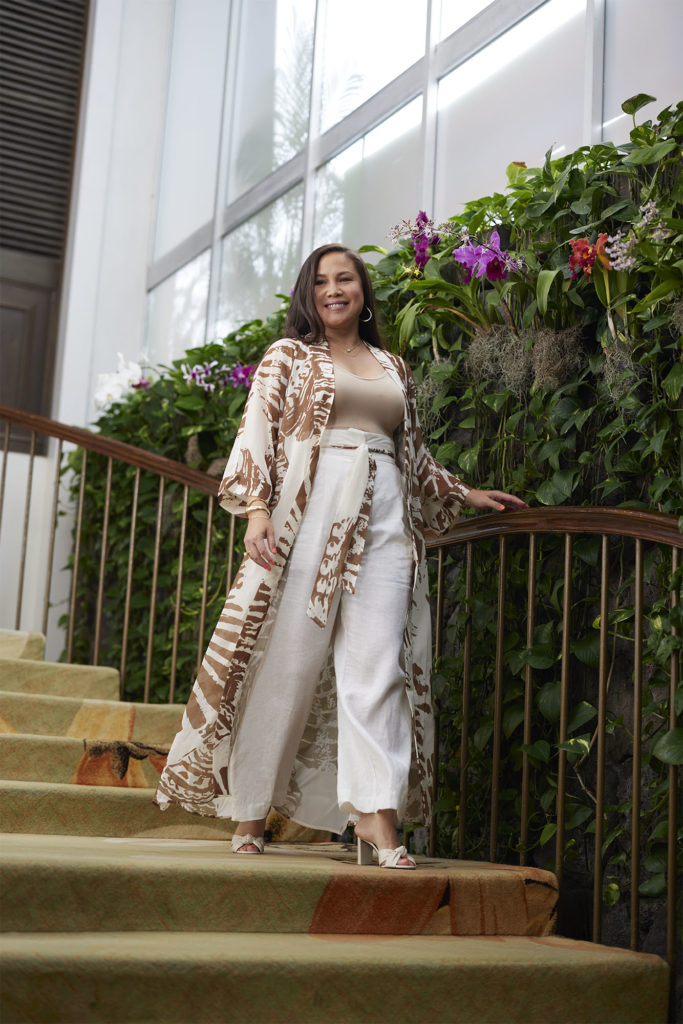
THE SECRET
The secret, James says, is a story to share with consumers.
“A big part of our job is education and helping companies succinctly and effectively and impactfully tell their story in a way that will ultimately drive sales,” James says. “We want to create a more educated consumer, which is on trend right now. People are looking for micro brands that are transparent and authentic, and have a cultural aspect to who they are. That wasn’t really the case 10 years ago, right?
Mana Up’s vision is to see its cohorts become the next Honolulu Cookie Company, Maui Brewing, or Hawaiian Host — easily recognizable brands among consumers on the mainland or around the world that build up and sustain Hawaii’s local community through economic diversification, high-quality jobs, further investment, and a regenerative culture of entrepreneurship.
“We’re globally loved, globally recognized,” James says. “How do we create more of these kinds of companies that are headquartered in Hawaii and are elevating the brand of Hawaii?”
To launch Mana Up, James partnered with Brittany Heyd, “who is my absolute yin to my yang,” James says. “We have very complementary skill sets.”
Over the past six years, they’ve grown Mana Up to also include a $6.3 million venture fund; three retail stores; an online shop; a partnership with Hawaiian Airlines, which offers Mana Up’s brands on flights; as well as a fulfillment center to help distribute products for cohorts and handle logistics and shipping to reduce operating costs. It’s essentially become a mini Amazon.
Mana Up is now introducing a new Wayfinder program for later stage companies that are generating more than $1 million in annual sales and need to rethink the structure of their business.
“Our goal is to help build the next 100 companies in Hawaii at $10 million or more in annual revenue,” James says. “What would a billion dollars do for Hawaii? What would that look like from a jobs standpoint?”
Mana Up Isn’t just backing any start up with a good idea. In fact, businesses need to have generated more than $100,000 to be accepted by the accelerator, and there is no exchange of equity and investment. That hasn’t mattered, with 138 applicants recently vying for 10 spots in the accelerator program.
The idea is for the brands to take advantage of Mana Up’s resources to get into more retailers locally, nationally, globally and online.
“Our accelerator is really meant for companies ready to scale,” James says.
Our goal is to help build the next 100 companies in Hawaii at $10 million or more in annual revenue. What would a billion dollars do for Hawaii? What would that look like from a jobs standpoint?”
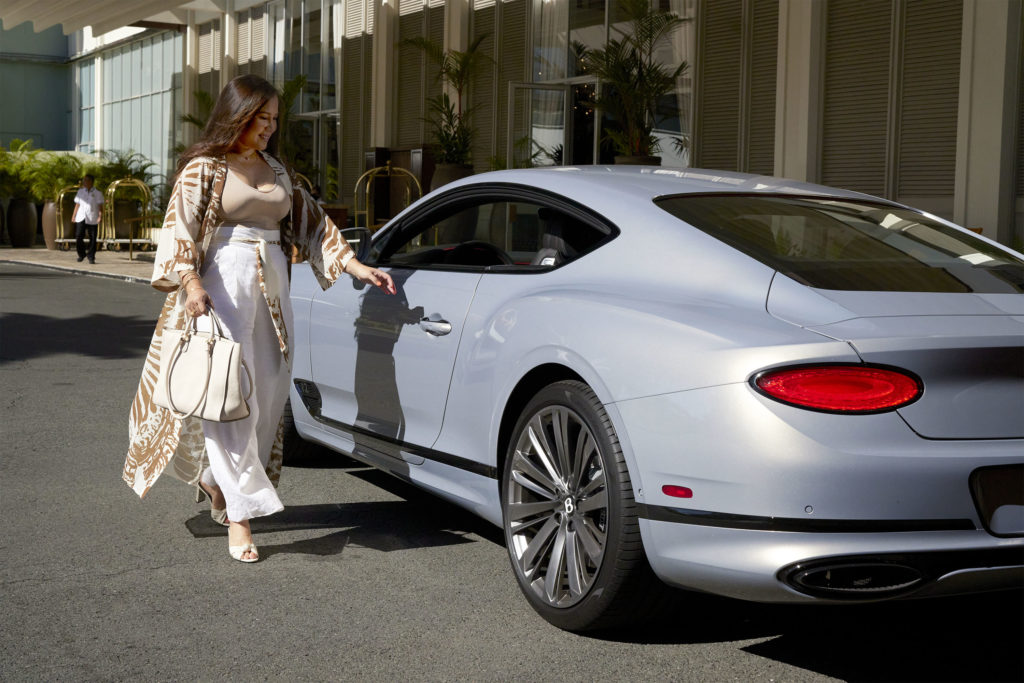
CURATED EXPERIENCE
Mana Up’s program consists of an intensive six-months of workshops and meetings to educate brands about digital marketing, e-commerce, media training and evaluate their overall infrastructure. “It’s a curated experience,” James says.
The company also hosts annual retreats, brand showcases and other events to bring the founders of its cohorts together and encourage collaborations.
“Entrepreneurship can be very lonely so it’s really neat to be able to have this great group of founders get to know each other and share ideas,” James says. “Sometimes it’s a lot more relevant when someone just went through a challenge as opposed to maybe a mentor that had that challenge 10 years ago.”
James knows first hand about those kinds of challenges. She’s been there.
At 27, she moved to San Francisco and started her first company, Nirvino, which initially launched as the first mobile website for wine before evolving to become the No. 1 wine app, a Top 100 overall paid app, and Top 10 lifestyle app on the iTunes platform for five years — around the time Apple’s iPhone was introduced.
“It was a crazy ride,” James says. “It was like the wild wild west in the app world.”
Being a female founder of a tech company in Silicon Valley, in 2007, “was really hardcore,” she says. “I wouldn’t call it the worst of the worst, but it was definitely pretty gnarly sometimes.”
At the time, James, who was born and raised on Oahu, felt she had to leave for the mainland because “it was this unspoken thing that if you wanted to do something different, that Hawaii wasn’t the place to do that.”
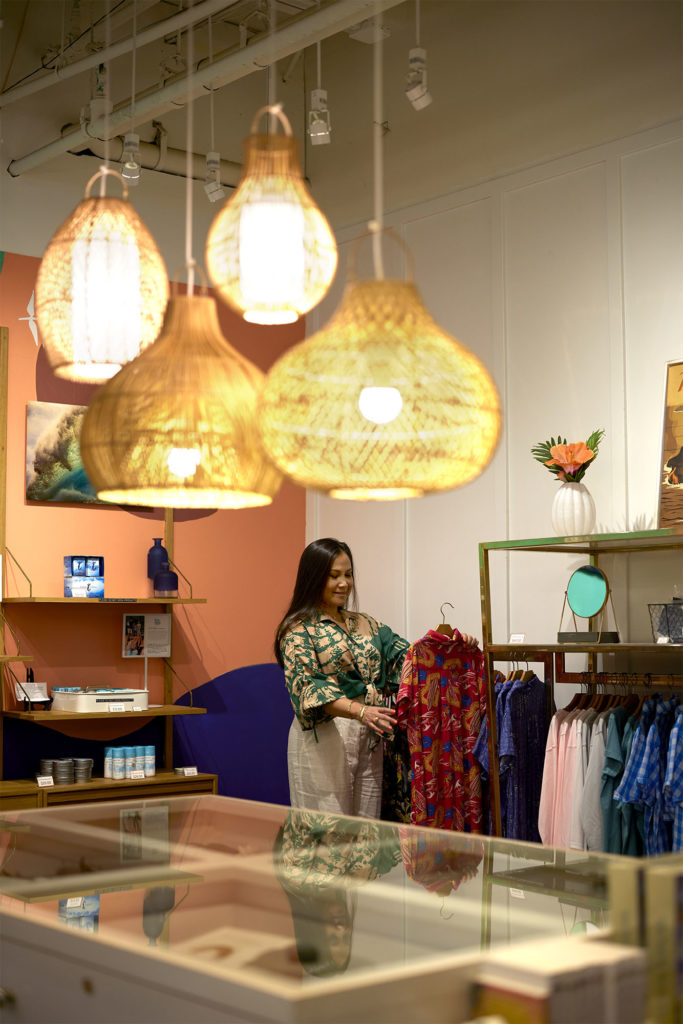
SUCCESS BREEDS SUCCESS
After the success of Nirvino, James decided to move back to Hawaii “to see what I could do to contribute to building an innovation ecosystem in Hawaii. Why couldn’t we have the startup world that I had fallen in love with in Silicon Valley, in San Francisco, in Hawaii?”
James began working with local accelerators like Blue Startups on the mentorship and investor side and began problem solving. The focus was on tech— on who would be the next Twitter or the next Facebook — but James wanted to broaden the scope to look at the regional strength and competitive advantage Hawaii offered to grow companies across all categories and build on “what is going to be helpful for companies to not just start here, but to stay here and thrive here.”
Hawaii has just needed tangible examples of successful entrepreneurs, successful products and successful businesses to inspire others to say, “I can do that, and you no longer have to be the first person or find yourself against all odds,” she adds.
The Hawaiian community is certainly embracing what James is doing.
“Success breeds success, and a lot of our community wants to be part of that,” James says. Hawaiian Airlines is a partner, and features Mana Up’s brands on its flights, while other local businesses are supporting the organization’s brands through corporate gifting. “They’re buying local and investing in each other.”
Embracing local ingredients and elevating native culture is key to establishing a sense of place and community in a brand’s storytelling.
“It’s like, when you light that candle, you put on that lotion, you see that picture … you get that wonderful feeling of aloha whether you’re able to come here or not,” James says.
Nearly 40 companies backed by Mana Up are devoted to food. Around 60% of those are utilizing local Hawaiian ingredients that come from farms and other suppliers in their product mix. That’s also true with an increasing number of health and beauty products.
“It really creates that uniqueness that other companies can’t replicate,” James says.
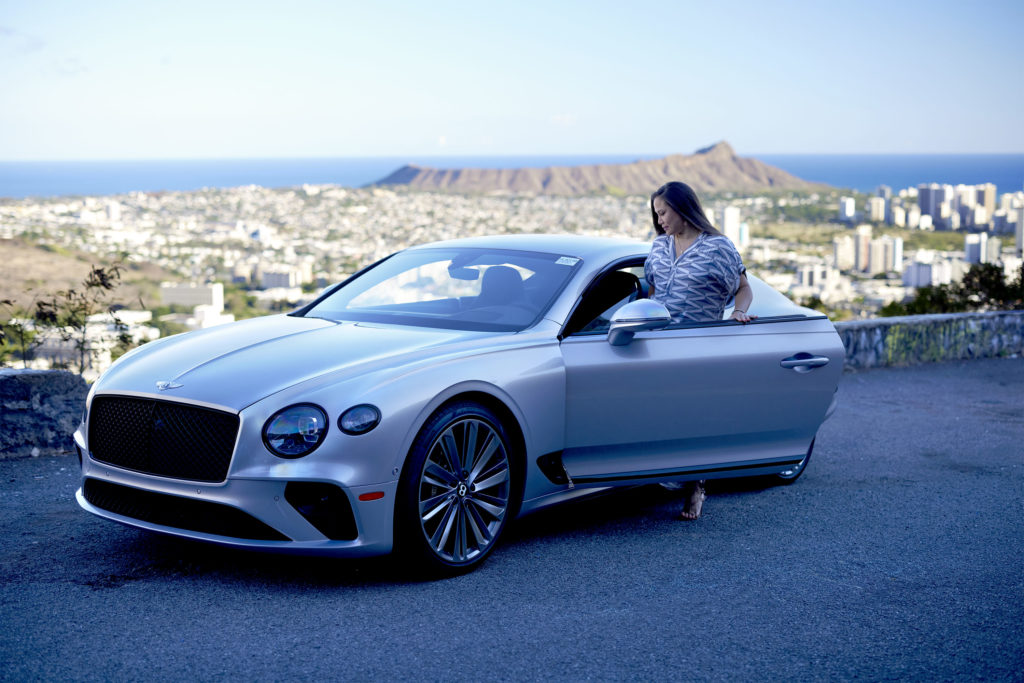
GOOD STORY
That interest in a brand with a story also is helping build luxury brands.
“What makes luxury approachable and desirable and attractive is that deeper story and understanding of why it’s luxury,” James says. “When you can understand the person behind the brand and what it took to create that product, it really is about the story and the details that set it apart. Respect in that craft is what really creates that deeper connection.
“You want people to feel like it’s a privilege to be able to experience it and understand why it’s a privilege,” James adds.
Honing in on the story is helping get Mana Up’s brands recognized globally.
Hawaii is known for its coffee, especially in Kona, but Big Island Coffee Roasters saw that interest in chocolate on the islands is also growing, so it partnered with local farmers to create a chocolate bar with espresso shots that is now popular with consumers.
“Seeing this kind of new product development happening here in Hawaii is so exciting,” James says.
Similarly, the growth of KōHana Rum, has enabled the distillery to bring back true native Hawaiian sugar cane to its fields and process for its product, making it more authentically Hawaiian.
“A lot of it really comes from understanding why you started your company,” James says. “Always remember to focus on that when things get hard because they will.”
The pandemic forced many of Mana Up’s cohorts to rethink how they promote themselves and rely less on foot traffic in tourist areas. They needed a larger footprint online and had to diversify how they do business.
Again, because Hawaii is such a draw, people still wanted to experience the island’s products even if they couldn’t travel and that paid off handsomely for Mana Up’s brands that were ready to diversify and meet that demand. Half of Mana Up’s brands recorded their highest revenues in 2020.
“We’re proud of how many of our companies have grown exponentially, especially in how much they quickly picked up and grew their online presence,” James says.
What drives James is problem solving.
“I’m always looking for inefficiencies or a better way to do something,” James says. “I see the world as an opportunity to help solve challenges that others can benefit from. That’s what makes it really fun and exciting to wake up every day.”
For this interview, we chose to meet Meli James in Honolulu in a Bentley Continental GT Speed W12, in extreme silver, the fastest consumer vehicle the British automaker makes — perfect for the head of an accelerator.
To explore your perfect Bentley, visit your local dealer.


